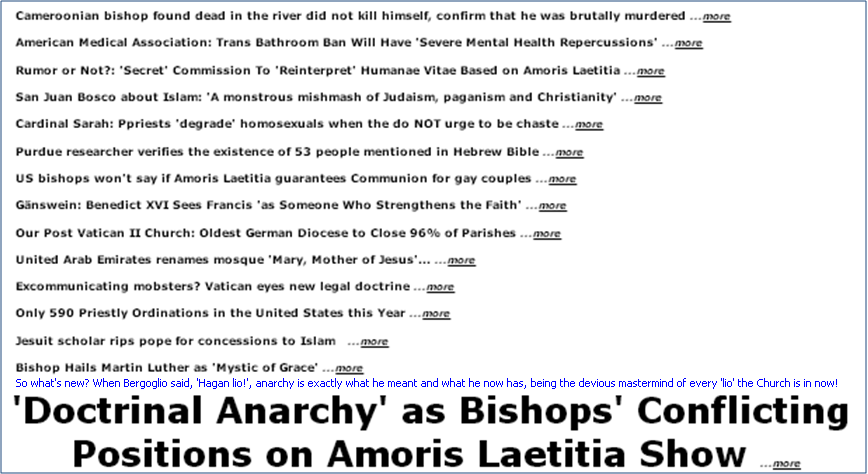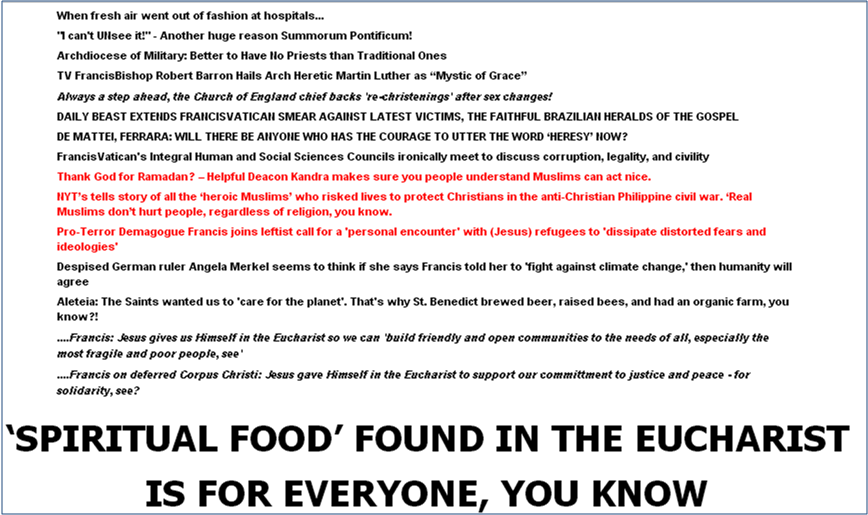June 18, 2017 headlines
PewSitter

The banner headline above links to a blogpost by Edward Pentin who provides a sort of status report on the Bergoglio-generated
anarchy in current and forthcoming pastoral practices regarding communion for remarried divorcees.
'Hagan lio!', he said,
and here we are in worse than 'lio'

June 18, 2017
Since the publication last year of Pope Francis’s apostolic exhortation on the family Amoris Laetitia, a “doctrinal anarchy” that was feared and predicted at the synods on the family is becoming apparent.
Belgium’s bishops have become the latest to read the exhortation as giving — under certain conditions but with an emphasis on the primacy of conscience — access to the Sacraments for some civilly remarried divorcees without an annulment.
They follow the bishops’ conferences of Malta, the Philippines and Germany, as well as some bishops from other countries who have issued similar guidelines and statements for interpreting Amoris Laetitia’s controversial Chapter 8.
By contrast, Poland’s bishops’ conference last week became the first national conference to declare that Amoris Laetitia has not changed Church doctrine on Holy Communion fo
r the divorced and civilly remarried, and that they continue not to have access to the Sacraments as the Church considers them to be living in an objective state of adultery.
In a statement following their annual plenary meeting, the bishops said the exhortation must be read in continuity with Church teaching, especially with regards to Pope St. John Paul II’s 1981 post-synodal apostolic exhortation
Familiaris Consortio. That document stated the Church was not to allow remarried divorcees to receive Holy Communion unless living as “brother and sister.”
Last year, the president of the Polish bishops’ conference, Archbishop Stanislaw Gadecki, said that giving Holy Communion could not be allowed following a period of pastoral discernment.
The Polish bishops’ position is echoed by that of Cardinal Gerhard Müller, prefect of the Congregation for the Doctrine of the Faith, who has continually maintained that Amoris Laetitia should only be interpreted in line with the Church’s teaching, and that it has not changed the Church's discipline.
Asked this week by the Register about his concerns about the issue, Cardinal Müller again doubled down on adhering to what the Church has always taught and practiced.
“We should help people who find themselves in a situation of marital difficulty,” the cardinal said, “but not only with pragmatic reflections according to the spirit of the world, but according to the Holy Spirit, with the means of the sacraments and the internal and canonical conditions for the reception of Holy Communion, which necessary includes the confession of all grave sin.”
[Yes, Your Eminence, but in the Bergoglio regime, both he and his chief theological adviser, Mons. Fernandez, have said with a wink that bishops and priests ought not to worry if the CDF goes after them! And can you really believe that any cardinal, bishop or priest who does not wish to rock the Bergoglio boat at all - for careerist reasons or otherwise - would even bother to read, much less care, what the CDF thinks about anything???]
The practical implications of this doctrinal confusion are already being witnessed.
At a Mass last Sunday in an Argentine parish, Bishop Ángel José Macín of Reconquista determined that after six months of discernment, parishioners living in irregular unions or divorced and civilly remarried could be included in full and sacramental Communion.
They may have all been living chaste lives as brother and sister, but the blog Rorate Caeli reported that at no point was that mentioned, nor was any reference made to the Lord’s commandment against committing adultery.
The reality of the situation is that the members of that Argentine parish have access to the Sacraments, but that would not be the case were they in a Polish one. Thus
your geographical location becomes the determining factor on whether you must adhere to traditional Church teaching and practice, or not.
“The first effect on the Church of doctrinal anarchy is division,” said Monsignor Nicola Bux, a former consulter of the Congregation for the Doctrine of the Faith during the pontificate of Benedict XVI.
This is “because of apostasy,” he added, “which is the abandonment of Catholic thought, as defined by Saint Vincent of Lerins: quod semper, quod ubique, quod ab omnibus creditur (what has been believed everywhere, always, and by all).” [Thank you, Mons. Bux, you confirm me in my use of the word APOSTASY rather than HERESY to describe Bergoglianism.]
St. Vincent was a 5th century Church father who distinguished the legitimate growth in understanding of divine revelation from the false alteration of religion and Catholic orthodox dogma.
Msgr. Bux warned that
the Church “cannot change the faith and at the same time ask believers to remain faithful to it.”
Further problems relate to how priests are dealing with the ambiguity over the change in practice, with bishops reporting many incidences of deep confusion as well as issues of obedience and conscience. A few clergy have reportedly abandoned the ministry as they refuse in conscience to give Holy Communion to remarried divorcees not living in continence.
A key problem is that the Pope’s own position on this issue has been ambiguous. Although last year he backed an Argentine bishops’ directive advocating support for giving Holy Communion to some remarried divorcees and, a few months ago, wrote a letter thanking Maltese bishops for their guidelines on interpreting the document, he has yet to state an official position, despite being formally asked to do so by four cardinals. [Bergoglio has not been denounced enough, and hardly ever, by calling his refusal to answer the DUBIA nothing less than dastardly COWARDICE - it goes beyond mere jesuitistic casuistry - which is all of a piece with the COWARDICE that underlies his tender kid-gloves treatment of Islamism, and his punctilious political correctness in everything secular. In fact, one should define political correctness as both hypocrisy and cowardice.]
Cardinals Carlo Caffarra, Walter Brandmüller, Raymond Burke, and Joachim Meisner sent him a list of dubia last September - five key questions about his fundamental propositions in Amoris Laetitia to resolve confusion about his ambiguities and to determine if the document is really in continuity with the Church’s teaching.
The Pope has asked Cardinal Müller not to respond, but said in an interview that
some, “as with certain responses to Amoris Laetitia, persist in seeing only white or black, when rather one ought to discern in the flow of life.” He added that these “critiques — if they’re not from an evil spirit — do help. Some types of rigorism spring from the desire to hide one’s own dissatisfaction under armor.” [Oh no, Padre Jorge! The critiques are not from an evil spirit - it is the object of these critiques which is!]
Speaking last year at a presentation, Archbishop Bruno Forte, who was special secretary during the synods on the family, shared comments the Pope made during the synod which give an indication of his approach.
“If we speak explicitly about Communion for the divorced and remarried, you do not know what a terrible mess we shall bring on ourselves,” Archbishop Forte reported the Pope as saying, reportedly adding: “So we won’t speak plainly - do it in a way that the premises are there, then I will draw out the conclusions.”
The current situation is causing widespread unease, frustration and anger. German Catholic journalist Peter Winnemöller, writing on the Austrian website Kathnet, said he found it
hard to believe that this “absurd situation” is what Pope Francis means when he says he wants the decentralization of the Church.
[What else, though? Look at how he articulated his proposed 'decentralization' in Evangelii gaudium - in which he clearly said he also wished to give bishops doctrinal autonomy. In other words, Bergoglio's decentralization means destroying the very catholicity of the Church, because in making every bishop doctrinally autonomous (they already are pastorally autonomous), he is thereby enabling a multiplicity of local, .i.e., diocesan, churches that are not obliged to be in communion with Rome. Goodbye, universal Church; say hello to the independent Bergoglian diocesan churches that have now been generated by Amoris laetitia!]
The “valuable suggestions” made at the synod to strengthen the Sacrament of marriage and the family are “unfortunately being completely undermined” by the chapter and its “problematic interpretation,” Winnemöller added. This is exacerbated by the Pope “in not making a binding decision and announcement.”
Canon212.com

[Modificato da TERESA BENEDETTA 19/06/2017 22:00]